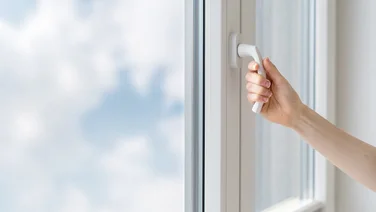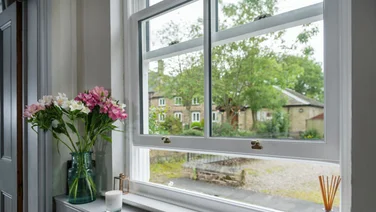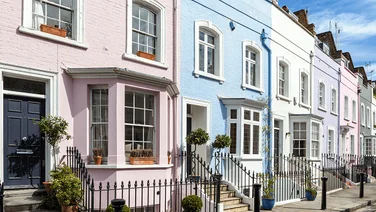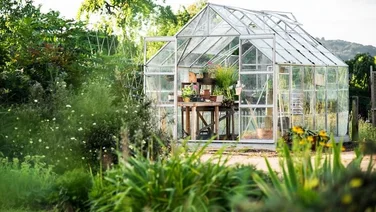We receive a small fee from trusted installers when you request a quote through our site. This helps us keep our content independent, well-researched and up to date – Learn more
- What government grants are available for double glazing?
- Are there double glazing grants for pensioners or over 60s?
- What is the ECO4 Scheme and who is eligible?
- What is ECO Flex and how does it differ from ECO4?
- Warm Homes: Local Grant
- Home Energy Scotland Grant and Loan
- Affordable Warmth Scheme
- How much can you save with double glazing grants?
- What do I do if I don’t qualify for any double-glazing grants?
- What can I do with old double glazing?
- Summary
- Government grants are intended to help low-income households save energy
- Many households will not be eligible as the criteria are quite strict
- Interest-free loans are available to replace windows in Scotland
- Most big double-glazing installers offer finance options via third parties

One of the most effective ways to reduce your energy bills is to install double-glazed windows and doors.
The core advantage is cutting down on your monthly bills, but double-glazing eliminates cold draughts, reduces condensation and mould, and significantly improves your home’s insulation. What’s more, you’ll notice that your home is quieter and feels decidedly more cosy.
The average cost for double glazing in the UK is around £11,000. Government grants and funding schemes exist to cover this cost, but they are primarily intended for the lowest-income households and have strict eligibility criteria.
We often get asked if window companies offer finance options. If you’re wondering about this, visit our dedicated page.
If you do not quality for a grant to get new windows and doors for your home, you may want to look at finance options that will help you spread the upfront costs into more manageable monthly payments.
As well as government grants, there are company initiatives, such as Anglian’s scrappage scheme, which allows you to recycle your old double glazing to help offset the cost of a new installation. To find out more about it, check out our dedicated guide on the subject.

Get free double glazing quotes
Answer a few quick questions, and our trusted installers will send you bespoke double glazing quotes – for free.
What government grants are available for double glazing?
There are no specific grants for windows and doors, but double glazing is covered by various energy-saving home improvement schemes, including the ECO4, ECO Flex, Warm Homes, and Affordable Warmth Schemes. The table below provides a quick overview.
| Grant | Type of installation | Regions covered | Eligibility criteria | Timespan |
|---|---|---|---|---|
| ECO4 and ECO Flex | Double glazed doors and windows | England, Scotland, Wales | Low-income and fuel poor households | 1 April 2022 – 31 March 2026 |
| Warm Homes: Local Grant | Can be used for insulation and other purposes, such as double glazing | England | Low-income households, low energy efficiency rated property | March 2025 – ongoing |
| Home Energy Scotland Grant and Loan | Upgrading single glazing and draught proofing area available | Scottish homeowners | Scotland | May 2017 – ongoing |
| Affordable Warmth Scheme | Draught-proofing windows and doors, replacing single-glazed windows and doors | Northern Ireland | Residents earning under £23,000 annually | September 2014 – ongoing |
| Welsh Government Warm Homes Nest Scheme | Energy-efficient home improvements (currently excludes double glazing) | Wales | Based on income-related benefits and properties with low energy performance ratings | 2011 – ongoing |
Are there double glazing grants for pensioners or over 60s?
Eligibility is not based on age alone, but the ECO4 scheme and the Home Energy Scotland Grant and Loan are often available to pensioners depending on individual circumstances.
If you live in an older property, we’ve answered whether you can install double glazing on a listed building.
What is the ECO4 Scheme and who is eligible?
ECO4 is the fourth version of the government’s Energy Company Obligation (ECO) scheme, which ends in March 2026. The government announced in its Budget in November 2025 that it would cut the ECO4 scheme because it has not provided enough value for homeowners and also accusations of fraudulent practice.
The scheme obliges a list of select energy providers to pay for energy-efficient home improvements for low-income and energy-poor households.
Improvements that the Ofgem-administered scheme covers include cavity wall insulation, boiler replacements, heat pump installation, and double glazing (replacing single glazing with double glazing, or replacing old double glazing).
There is no set amount for funding with ECO4 since it depends on what your chosen energy supplier decides your home needs.
What are the ECO4 eligibility requirements for double glazing?
You might be eligible to get double glazing with ECO4 if:
- Your home has a low EPC rating (D to G)
- AND someone in your household receives at least one of the following benefits:
- – Child Benefit
– Pension Guarantee Credit - – Income-related Employment and Support Allowance (ESA)
- – Income-based Jobseeker’s Allowance (JSA)
- – Income Support
- – Tax Credits (Child Tax Credits and Working Tax Credits)
- – Universal Credit
- – Housing benefit
- – Pension credit saving credit
You don’t need to own your home to receive funding from ECO4; it’s open to private tenants (with their landlord’s permission) and those in social housing.
See Ofgem for further details.
How to apply for ECO4
To apply for ECO4, contact one of the energy providers participating in the scheme.
This doesn’t need to be your current supplier, and Ofgem actually recommends that you contact multiple suppliers to find the best deal.
Energy suppliers that can carry out improvements under ECO4
Here’s a list of the energy suppliers that are part of ECO4 and how to contact them:
- British Gas: application portal
- E (Gas & Electricity): email James.thornicroft@e.org
- E.ON: application portal
- Ecotricity: email compliance@ecotricity.co.uk or call 07529 902172
- EDF: application portal
- Octopus Energy: application portal
- Outfox the Market: email hello@outfoxthemarket.co.uk or call 0800 103 2702
- OVO Energy: application portal
- Scottish Power: application portal
- Shell Energy: email eco@shellenergy.co.uk
- SO Energy (including ESB Energy): application portal
- The Utility Warehouse: call 0333 777 0777
- Utilita Energy: application portal
Alternatively, you can also apply through the Gov UK website.
**Every participating energy supplier listed here provides a dedicated online application portal or contact method to confirm eligibility.
Once you have done this, you’ll receive an email containing a unique reference number and a document. You will be asked for your permission to contact the Department of Work and Pensions to confirm your benefits.
Within a week, you will typically be contacted to arrange a free survey. This survey will ask you to carry out a 10-15 minute inspection of your home’s energy efficiency measures and is designed to be minimally intrusive.

Get free double glazing quotes
Answer a few quick questions, and our trusted installers will send you bespoke double glazing quotes – for free.
What is ECO Flex and how does it differ from ECO4?
ECO Flex is a mechanism in the ECO4 scheme that allows local authorities, the Scottish and Welsh governments, and energy suppliers to refer households for energy improvements funding, even if they don’t meet the benefits criteria of ECO4.
The scheme was designed to open up grants to more low-income households, as many don’t meet the threshold to receive benefits.
Check with your local authorities and/or energy provider to see if you qualify for the window replacement grant.
ECO Flex eligibility requirements for double glazing
To be eligible for ECO Flex through a referral from your local authority or devolved nation, you must live in an energy inefficient home AND:
- Have a household gross annual income of £31,000
- OR a person in your household has a health condition that makes them vulnerable to the cold (a cardiovascular condition, a respiratory disease, limited mobility, or immunosuppression)
To get referred to ECO Flex by your energy supplier, you must:
- Be on a non-Pre-Payment meter and have been in fuel debt for over 13 weeks
- OR be on a Pre-Payment meter and have self-disconnected, OR have received supplier discretionary/friendly credit within the last 13 week, OR be in a debt repayment plan with their energy supplier, OR be repaying your fuel debt through 3rd party deductions
Contact your local authority or devolved nation to find out if you’re eligible for ECO Flex. You can usually find contact details on their website.
Energy suppliers usually refer customers, but you can still contact them if you think you qualify for ECO Flex and they haven’t yet done so.
Warm Homes: Local Grant
The Warm Homes: Local Grant began its delivery this year and aims to provide homeowners with energy performance upgrades via local authorities.
This scheme is only open to households that:
- Live in England
- Have a low income of £36,000 or less
- Have an Energy Performance Certificate (EPC) between D and G
- Your home is privately owned (owner occupied or privately rented)
Local authorities are able to install several energy performance measures, including insulation, solar panels and double-glazed windows and doors.
Upgrades are tailored to individual homes so the most appropriate measures are installed and occupants will not contribute to the cost of upgrades.
You will also need to determine your postcode qualifies, which you can check here.
How to apply for the Warm Homes Local Grant
If you meet the above criteria and your postcode is eligible, then you are able to apply using the government website. Access it here.
Some of the questions it will ask you are:
- Which country is your property located in?
- Do you own your property? If you have a shared ownership proper, select ‘No, I am a tenant or social housing tenant”
- What is the address of your property?
- What is your annual household income?
From here, it will tell you if your local authority is signed up to the scheme and send your application off. If it isn’t, you can provide your email address to be updated.
If you local authority is signed up, they’ll process your application and be in touch.

Get free double glazing quotes
Answer a few quick questions, and our trusted installers will send you bespoke double glazing quotes – for free.
Home Energy Scotland Grant and Loan
Home Energy Scotland is a scheme funded by the Scottish Government that will help you replace single glazing with double glazing, among other energy saving home improvements.
Grant funding isn’t available for double-glazing, but you can get an interest-free loan to replace single-glazed windows and doors with double-glazed ones.
The loan cannot be used to replace old double glazing.
Home Energy Scotland eligibility requirements
You might be eligible for the Home Energy Scotland loan if you meet one of the following requirements:
- You’re a homeowner living in Scotland
- You’re building your own home
- You’re not a landlord
- You’re not a property developer
How to apply for the Home Energy Scotland
Home Energy Scotland is advising applicants to complete a Home Energy Check before reaching out to them.
Once you’ve done that, you can phone 0808 808 2282 or use Home Energy Scotland’s email contact form. Someone will run through the best options for your home with you.
You can find a full guide of the application process on the Home Energy Scotland website.
Affordable Warmth Scheme
The Affordable Warmth Scheme was launched in 2014 and aims to protect low-income homes in Northern Ireland from fuel poverty by providing £7,500 toward energy efficiency improvements, such as installing new double glazing.
If your home is solid-walled, the grant can be increased to £10,000.
If you are a homeowner or private property tenant in Northern Ireland and your total gross income is less than £23,000 per year, you may be eligible for assistance getting new windows. The amount you qualify for will be determined after an inspection of your home and your specific needs.
This assessment will also determine the extent of work needed to be carried out, but it can quickly provide sufficient funding for a grant for double-glazed windows.
Affordable Warmth Scheme eligibility requirements
You might be eligible for the Affordable Warmth Scheme (NI) if you meet one of the following requirements:
- You are a Northern Irish resident (obviously)
- You own and occupy your property as your main home or you rent from a private landlord (i.e., not social housing)
- You have your day/life interest in the house (i.e. not a holiday home, B&B, or a building used for commercial practices)
- You have a total annual gross income of less than £23,000
How to apply for the Affordable Warmth Scheme
If you meet the criteria above, you make an application to the Affordable Warmth Scheme via the NI Energy Advice Service (NIEAS) by phone at 0800 111 44 55 or via email at NIenergyadvice@nihe.gov.uk.
If you are deemed eligible, a technical officer will visit your home for an inspection. This will assess the energy efficiency measures needed, especially those provided by the scheme.
It is important to note that the scheme offers upgrades in priority order based on a four-tiered hierarchy. These are as follows:
- Priority 1 covers installing or replacing cavity wall insulation and the draught-proofing of windows and doors.
- Priority 2 covers heating improvements such as boiler replacement.
- Priority 3 covers the replacement of single-glazed windows.
- Priority 4 covers solid wall insulation.
If an applicant is successful, improvements will be carried out in the order of priority until the funding is used up.

Get free double glazing quotes
Answer a few quick questions, and our trusted installers will send you bespoke double glazing quotes – for free.
We spoke with Marta Pawlik, co-founder of Laik, a holiday-let management and design company based in the UK.
“We installed double glazing in some of our holiday lets, with a three-bedroom stone house costing around £10,000 on average.”
“During the winter, heating costs fell by approximately 25 percent and we broke even in slightly more than four years.”
What do you you spend on maintenance for the double glazing?
“The double glazing has received little maintenance (other than one property needing resealing for £180). Really, once it’s installed, double glazing will last for years without any significant maintenance required.”
Would you recommend double glazing to other businesses?
“I would recommend businesses check they can install double glazing (as listed buildings in the letting industry can require permission), but the energy savings from double glazing is worth the upfront cost.”
How much can you save with double glazing grants?
The ECO4 grant could save you 100% of the cost of buying and installing double glazing.
The Scottish Home Energy Loan could save you hundreds of pounds since it’s an interest free-loan, making paying in installments much cheaper than if you’d gone with an installer’s financing option.
As a nice bonus, investing in your property with improvements (like double glazing) can also increase the value of your home.
If you want to get started on making your home more efficient, take a look at our seven easy ways to improve your property’s EPC rating, and our guide to government grants for insulation that can help fund your projects.
If you’re interested in new windows and want to see how much they’ll set you back, have a look at our double glazing cost calculator.
What do I do if I don’t qualify for any double-glazing grants?
If you don’t qualify for double glazing grants, there are other ways to reduce costs. Here are just a few:
- Some other options exist, like Green Deal Loans and the Barclays Greener Home Rewards (Barclays Mortgage customers only).
- Get at least three quotes from different double-glazing installers and negotiate to find the best deal
- Go for the least expensive materials and designs, such as uPVC casement windows
- Choose fixed panes, which are cheaper than windows you can open, for entrance halls, corridors, and other rooms that don’t need an open window
- Opt for double-glazed windows with a lower energy rating – B or A – as they’re cheaper than A+++ windows and still more insulating than single-glazing
- Have your windows installed in winter, especially right before Christmas when demand is low and prices go down. Some installers also have sales in January. Others may even offer in-house finance options to help spread the cost.
Hopefully, these tips can help you reduce costs. Just remember to be wary of cheap double glazing. Price can reflect quality; as with most things in life, if something is too good to be true, it probably is.
What is the typical lifespan and required maintenance of new double glazing?
Double glazing usually lasts about 20-35 years, potentially lasting 40-50 years depending on the quality of work and continued maintenance.
UPVC material generally lasts 20-35 years, aluminium – which is highly durable – can last from 30-40 years with little maintenance. Timber lasts the longest (as long as 60 years) but it requires the most maintenance, and it can rot away quickly without it.
Required maintenance for double glazing includes: cleaning the glass and frames every 3-6 months using warm, soapy water, avoid using harsh chemicals, cleaning tracks and rails and periodically cleaning seals and gaskets around the glass.
What can I do with old double glazing?
Old or unused double-glazed windows can be recycled. Window installers will typically remove old windows from your property for you, but not all of them recycle – the windows often end up in landfills.
If you want to avoid this, you can recycle certain parts of the windows, such as the glass panes, at a local recycling centre. Or you can contact a window recycling specialist company, such as VEKA Recycling.
Summary
- There are two government grants that can be used for double glazing: the ECO4 Scheme and the new Warm Homes Local Grant
- Unfortunately, the Home Energy Scotland Grant can’t be used for double glazing, but you can get an interest-free loan through the scheme
- It never hurts to check if you’re unsure whether you meet the criteria for any of these government schemes; they could save you thousands of pounds on your installation
- If you’re not eligible for any grants, it’s still worth investing in double glazing if you can. According to the Energy Saving Trust, replacing single glazing with double glazing can save you up to £180 a year on energy bills
- Fill in our short form, and we’ll pass your details on to professional double glazing installers. They’ll contact you to give you a competitive quote based on your requirements









